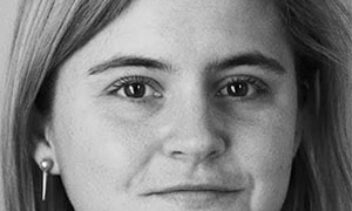It can be said that Kelsey Osgood’s beat is religious change. An accomplished writer, Kelsey has covered everything from the Hasidic rock scene to Amish converts, with stops along the way for Montauk shark-fishing, pacifism and Kafka. Kelsey’s voice is strongest when talking through the lens of her own life—a life that has been marked by struggles with eating disorders and deeply thought religious transformation—and her reflections on the way religious life experiences change across religious and spiritual boundaries. In this week’s Weekend Reader, read the important takeaways from Kelsey’s recent interview with 18Forty founder David Bashevkin, available here.
Religion and the Insider-Outsider
The usual binaries we employ to think about religious life—distinguishing between religious/secular Jew/gentile—can so often create complex challenges for those entering, or leaving, religious life. In a piece at the Forward, Kelsey describes the first Seder she attended, and the complicated feelings of being an outsider at this deeply Jewish ritual:
The group read aloud: “Still we remember it was we who were slaves, we who were strangers, and therefore we recall these words as well: you shall not oppress a stranger, for you know the feelings of the stranger, having yourselves been strangers in the land of Egypt.”
However adolescent this makes me sound, I must admit that I considered, for a brief moment, that these people were talking about me. At that moment, I felt like I was the stranger in the Haggadah. I didn’t want reprieve from oppression, exactly, but I craved acceptance. Even though I’m not of you, I thought, I hope you can welcome me. Because I am here, and I love you.
But entrance to the faith community doesn’t simply make the outsider an insider, as Kelsey describes:
Five years later, and three years (give or take) into a conversion process, I no longer feel like a perpetual guest in the home of my in-laws, nor do I stumble through the Seder service, looking to my neighbor to see if I’m on the right page. But I do retain that alien feeling overall, in environments Jewish and Gentile.
At Sabbath services, I’m surrounded by people whose lips flutter effortlessly over the prayers, who know intuitively when to stand up and when to sit, whereas I’m sounding out the Hebrew like a kindergartner, falling ever further behind. At dive bars where I meet friends for drinks, I am the only one whispering a blessing over my mug of beer, and usually my friends aren’t terribly interested in the anxiety I’m dealing with over kashering my kitchen.
And though my first Passover Seder experience may have made me feel “the feelings of the stranger,” it also sensitized me to the pain of any other person—Jewish or Gentile—who feels like they are in a foreign land.
This sense of non-belonging is not specific only to the Seder, a night particularly devoted to the Jewish story, but may be a more universal experience for all those whose religious identities change. For Atlas Obscura, Kelsey spoke to Amish-Mennonite converts in Ohio and reflected on this complicated dynamic:
Does love inevitably draw us further into our loved one’s orbit, or can affection thrive from a distance? Can you admire something without eventually wanting to imitate or even become it? And if you do try to become it, can you ever really belong? Or do converts always feel a little like anthropologists, knowing that if things ever got too tribal for their tastes, they could dust off their old clothes and take up residence in their old lives?
These are the kinds of questions that arise when one hears the stories of religious conversion, especially when the conversion requires a complete overhaul of one’s life.
Alienation Redeemed
This alienation presents a significant challenge to many who choose new religious identities, and for some proves insurmountable. Kelsey, reflecting on this sense of perpetual alienation, has found a way to redeem this alienation, turning it into a crash course in empathy:
I don’t, however, find this constant sense of foreignness depressing; instead, it’s enormously instructive. By being so often the stranger, I am hyper-attuned to the anxieties of those who feel different, whether they’re in foreign lands or out of their depth at work or even just those who have never quite felt at ease in the world because of something restless and inscrutable in their souls.
When we remind ourselves in prayer to love the stranger, I feel that is more often meant to be a plea to the world to remember that the Jews are not suspect by virtue of their differentness. But when I hear it, I’m thinking about all the strangers in my life: the guy who sells me coffee in the morning, the Satmar woman who attends the same synagogue I do, the young man in my neighborhood who uses forearm crutches and politely boards the A train every morning. I’m even thinking about my future spouse, whose heart, though very familiar to me, is not something I could claim to understand all the time.
At some point or another, we are all lonely strangers. And though my first Passover Seder experience may have made me feel “the feelings of the stranger,” it also sensitized me to the pain of any other person—Jewish or Gentile—who feels like they are in a foreign land.
In turning from her own feelings of alienation to the alienation of those around her, Kelsey redeems alienation from its oppressive distancing to a force for empathy. This introjection is characteristic of Kesley’s writing: Turning from her own experience outwards, she finds resonance in the religious changes of others. For Atlas Obscura, Kelsey speaks to Alex, an Amish-Mennonite convert in Ohio, and considers this sense of redeemed alienation inherent to immigrants to religious life:
Suddenly, I’m thinking about something I saw in church earlier that morning: in front of me sat a girl, maybe 10 or 12, a white cap pleated neatly around her light brown bun like a cupcake wrapper. A few times, she reached her skinny arm back, drew a silver pin from deep within her tightly coiled hair, moved the pin a fraction of a millimeter, and pushed it back into place. A tiny motion, a meaningless one maybe, but I felt like I was watching a dance savant, moving without thinking about the next step, or about any of the technicality behind her piece, unaware, in many ways, that she was dancing at all.
For religious insiders—those that grew up and lived their lives in the faith communities of their origins—these myriad motions come naturally, but to the wanderers and immigrants, such motions have meaning:
This is the kind of cultural fluency Alex always wanted, but can never have. This is the warmth of effortless identity people like Alex and me will never know. But that’s okay: though we’ll stumble over the wordings of our invocations sometimes, we’ll make up for it in the love we feel for our little worlds, and in the ways in which, as perennial outsiders, we can proclaim their worth with a special sort of authority.
“In the early days, I would have wanted to hide the fact that I didn’t grow up this way. Now I embrace it. Now it’s part of me.” At this, he grins and opens his arms, palms out, as if to say, here I am.
This is a powerful lesson for all, independent of one’s spiritual or religious origins: Find meaning in difference, relevance in alienation, and salvation in our stumbling. It is too easy to settle into one’s comfortably assumed religious identity and forget the voice of the past, but Kelsey reminds us that the strongest writing comes from the embrace of alienation, of difference.
In this, Kelsey makes the perfect conclusion to this month of conversation around OTD and religious change at 18Forty. Movement in religious life—no matter the direction—is important, and the most powerful voices in religious life are often those that have embraced a life of movement. Change, like growth, isn’t easy; it isn’t simple and it isn’t binary. Kelsey Osgood reminds us that it is our distinctive voices and life experiences that give our words purpose, and finding open meaning in our own complicated lives allows us to appreciate the lives of others with more depth and empathy. We end with her words in Narratively, characteristically titled “Jerusalem, Before and After Converting to Orthodox Judaism,” as she remembers praying in an alcove deep under the Western Wall:
I looked at the handful of women around me – maybe ten of them, ranging from teenagers to grandmothers. Each one was dressed in a long, earth-tone skirt and a standard head covering, and they were clustered together in the tiny, dark alcove, eyes fixed on their prayer books, the younger ones standing and swaying rhythmically, the older ones resting in white plastic chairs. I tugged nervously at my dress – calf-length, but a little too colorful, a little too mainstream. Did they know I was different? Could they detect my questionable Jewish-ness? After a few minutes, I realized that of course, none of these women were paying the slightest attention to me. None of them asked if I was Jewish as I wriggled for space at the wall; in fact, no one had asked me that once since my arrival.
Reaching out to touch with my fingertips the cold stone in front of me, I remembered what I had always known: that my beliefs alone cannot be managed, regulated or politicized by any external force. The contact—between my fingers and a physical spot charged with sanctity, between my inner self and the city of Jerusalem, between me as a person and the things I choose to find meaning in—cannot be altered by any institutional body. And as long as my faith in that unimpeachable right was continuously strengthened, then I, too, would be strong enough able to stand defiantly in the face of those who might doubt me, and to speak out in support of those like me.








